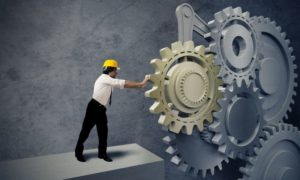At a fundamental level, your business consists of the following:
- A location.
- Some goods or services offered.
- Policies and practices that you have instituted and/or allowed to continue.
- Decisions you have made either as exceptions to the above policies and practices, or as expedients when a situation outside of the routine requires them.
Your business is a machine for which you, the owner, are solely responsible.

The distinction between things that are inside of the machine and things that operate outside the machine is important.
In a conversation on a friend’s social media feed, someone gave the anecdote of a toxic player saying something very cruel at the end of a card game tournament. My friend’s friend said that when the owner was told about this, he stated, “I can’t kick him out. He buys two booster boxes every set.” Do the math on a customer like this, and you’ll find that if they drive away ONE customer who would have bought three or four booster packs per week, then it’s a bad deal for the business. The store owner in this story kept an unpleasant jerk in his community so that he could lose money.
Another anecdote involved a female sports team trying out a new bar and being driven away by a leering regular who made inappropriate advances. The owner cited the long-term relationship with the customer, as if misbehaving somewhere long enough excuses misbehavior. The sports team picked another bar and meets there weekly. What did the owner give up to save a bad customer? How many times was this allowed to happen?
Your customers may offer suggestions or make requests, but in a healthy organization, they should operate outside the machine. Even their own personal habits in proximity to your business will set the tone for the entire operation if you allow it. They will not be grateful that you turn a blind eye to their misbehavior, and you will gain little or nothing in return for your misguided long-term tolerance. How many times have you over-invested trust and favors into what turned out to be a mediocre customer, only to have them vanish (or worse, become an advocate for your competition) without even saying goodbye? Good, bad, regular, and infrequent customers all come and go.
The machine offers customers functionality in that your business should be offering a carefully-considered value proposition. If they accept that proposition, they are welcomed and appreciated at the business. If they reject that proposition, then they can go eat rocks. They get to interact with the machine, but they don’t get to make changes to the operation, add parts, remove parts, or stand nearby and throw pennies into the gears.
Inside the machine, the decision about who turns the gears is important.
You may have employees who are empowered to make changes to the way you do business, or who are trusted to make decisions when you’re not around. Regardless of the independence with which those employees operate, they serve at your pleasure, so they’re unquestionably part of the machine.
I have allowed bad employees to stay too long because I cared for them. By the time they were gone, they had done real damage to my business. They were a part of the machine as they should be, but I allowed them to turn the gears in ways I would not have chosen. As employees, they are parts of the machine, and malfunctioning parts should be corrected or replaced. As people, their time spent in jobs that were not suitable for them was not a net positive in their lives, and the seemingly cruel early firing would have been a mercy to them in the long run.
Examine every part of the machine.
I see posts from business owners all the time in which they state that they’ve HAD IT with a vendor or supplier. Six months later, they are still grumbling. They have taken for granted that certain parts belong in the machine. If a product line isn’t performing, reduce its footprint or kick it out. If an entire segment of your business is costing you money, make a plan to improve it or get rid of it. It’s better to lose a part of your business that you love than to allow your entire business to fail because of it.
If the problems are annoying but do not threaten the operation of the machine, then learn to love the Dirtbag Dividend. It may be that there are mitigations to the problems that part of your business is experiencing. Friction is a problem in machinery, and even if it’s perfectly designed, it will probably still need oiling to function correctly.
If you spot a gear in the machine that works against the others, spins uselessly, or doesn’t spin at all, it’s your responsibility to change or remove it. The successful operation of the machine is more important than your idea of how it was supposed to operate.
Protect the machine.
If you step away from the machine and it manages to produce the desired result, then you have rolled the dice and won. A rudderless ship may occasionally travel someplace useful, but usually not. The most beneficial decision you can make for the operation of the machine on which you’ve bet these years of your short life is that you will approach as many aspects of your business as possible with intentionality and presence. I think that we have a tendency to wish that difficult decisions would go away, and that frequently manifests in delaying decisions until an outcome is already decided. Choosing to not turn a gear when its position is changing is still a choice. Deciding to step away and let things sort themselves out is a decision. Give some thought to which parts of your business could use your hands on the gears this week.
